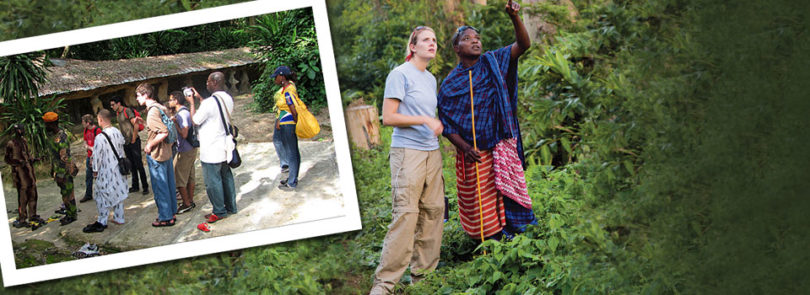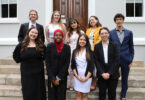Celebrating its 25th anniversary, UGA’s African Studies Institute has developed into one of the leading programs of its kind in the nation. UGA will commemorate the anniversary with various events and programs designed to showcase the value of this continent.
“The political, economic and cultural importance of Africa continues to grow, which makes this an especially opportune time for faculty, staff and students as well as community members to learn more about the continent and its people,” said Akinloye Ojo, director of the UGA African Studies Institute and associate professor of comparative literature and African studies in the Franklin College of Arts and Sciences.
The two-week 25th anniversary celebration kicks off Nov. 1 at the University Theatre with an 8 p.m. performance of “The Darker Face of the Earth,” a play by former Poet Laureate Rita Dove, that examines the reality of slavery. The play, directed by Freda Scott Giles, an associate professor of theatre, continues its run through Nov. 11. The play and many other anniversary events also are part of UGA’s Spotlight on the Arts festival, to be held Nov. 3-11.
In addition, the anniversary celebration will include an international conference Nov. 8-10 in the Richard B. Russell Building Special Collections Libraries. The conference, titled “Africa and its Diaspora: Expressions of Indigenous and Local Knowledge,” will encourage and document the ongoing conversation on the paradoxical dynamics of preserving the unique identity of African indigenous and local knowledge in an increasingly globalized and westernized world. The conference will offer a forum for intensive exchanges between scholars, researchers and technocrats who study Africa, the African Diaspora, the U.S. and other parts of the globe.
The conference also will bring several ambassadors from African nations-including Cote D’Ivoire, Lesotho, Mozambique, Nigeria, Senegal, Tanzania and Zimbabwe-together to discuss the African continent and the African diaspora on Nov. 8 at 2 p.m. in Masters Hall of the UGA Hotel and Conference Center at the Georgia Center. Renowned poet and scholar Tanure Ojaide, professor of Africana studies at the University of North Carolina at Charlotte, will deliver the keynote address on Nov. 9 at 9 a.m. in the auditorium of the Richard B. Russell Building Special Collections Libraries.
Additional 25th anniversary events, all of which are free and open to the public can be viewed at http://afrstu.uga.edu/news-events/25-years-african-studies-uga.
The African Studies Institute began as a faculty interest group in 1987. At that time, African studies was a fledgling academic discipline, particularly in the U.S. The African Studies Program, which became the African Studies Institute in 2001, made UGA a leader in studying and sharing knowledge from the societies and cultures of Africa.
The ASI is housed in the Franklin College and has 60 affiliated faculty members from almost every school and college at UGA. Its faculty conducts research and provides instruction, including study abroad and service-learning opportunities, to undergraduates as well as graduate students from diverse majors. The ASI offers an undergraduate certificate in African studies and an undergraduate minor in African studies. In addition, the institute supports the minor in African languages and literatures and the program in African languages and cultures, both of which are housed in the department of comparative literature.
“The last 25 years of African studies programming has been quite beneficial to UGA students, and we look forward to continuing that tradition,” Ojo said. “In addition to providing a better understanding of historical developments, our programming has provided the realization, especially through study abroad, that Africa provides one of the best venues to study the impact that interactions between humans and nature, particularly with regard to urbanization, deforestation, soil erosion, climate change and wildlife conservation, amongst other things, are having on the continent.”







